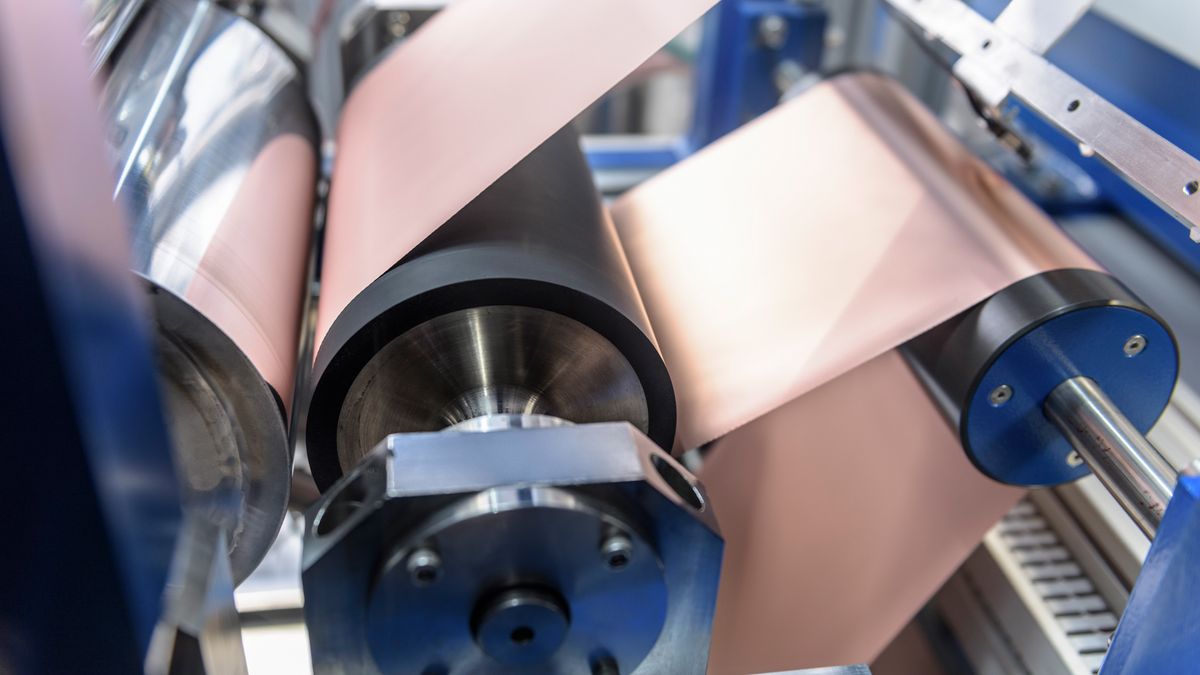
As part of the goal of tackling climate change, more and more people are using electric vehicles, which produce just a fraction of the carbon dioxide emissions as their gasoline-powered counterparts.
But how do the batteries in these electric vehicles work, and what determines how far an electric car can go and how long they last?
How do electric vehicle batteries work?
Batteries store energy by shuffling ions, or charged particles, backward and forward between two plates of a conducting solid called electrodes. The exact chemical composition of these electrode materials determines the properties of the batteries, including how much energy they can store, how long they last, and how quickly they charge after use.
Related: Is an electric car better for the planet?
Importantly, each electrode needs to be made of a different material so there is an energy difference between the positive end and negative end of the battery, known as the voltage. But both materials also must contain the same type of ion in their chemical structure as they must store, and later transfer these charged particles from one electrode to the other when the battery is being used. However, there's one more vital component: conducting fluid.
"The two electrodes absolutely don't touch each other. If they did, you wouldn't be able to extract any useful energy and the battery would just get hot," Jeff Dahn, an energy storage expert at Dalhousie University in Canada, told Live Science. "So you separate them and put an electrolyte, a type of conducting liquid, containing the same common ion in between."
As soon as wires are connected to the battery, completing the circuit, ions from the high-energy electrode (the negative terminal) move through the electrolyte solution toward the low-energy electrode (the positive terminal). At the same time, electrons also move from negative to positive through the wires. This controlled movement of charged particles allows drivers to draw power from the battery.
What are electric vehicle batteries made of?
Electric cars typically use lithium-ion batteries, which shuttle lithium ions between the electrodes. "Lithium-ion batteries have pretty incredible properties. They're very tuneable, so we can design them to fit a specific application through our choice of materials for the electrodes and the electrolyte," Dahn said. "Lithium-nickel-manganese-cobalt-oxide batteries (NMCs) are used in electric cars and come in a whole number of flavours depending on the performance you want."
Specifically, the nickel, manganese and cobalt are used in the positive electrode, and the precise ratio of these metals determines the properties of the battery. Car manufacturers must juggle lots of competing factors — including driving range, battery lifetime, weight and cost — to create the most appropriate vehicle for their customers.
Almost all NMC batteries use the same electrolyte and negative electrode. But chemists can tweak the battery properties further by adding special additives to these components. Tweaking chemical ratios can affect properties such as charging times and safe operational temperatures.
What determines electric vehicle range?
So how does chemistry affect the range of an electric vehicle?
"A high proportion of nickel gives you an excellent energy density — that's the amount of energy per unit of volume — so you'll have a long range for a small battery," Dahn said.
Energy density is determined by the voltage between the two electrodes and how many lithium ions the material can hold. Electrodes with nickel form a crystal structure that can pack in more lithium ions.
The downside?
"It's expensive, and the lifetime will be shorter than lower-nickel materials (although still longer than most other cars)," Dahn said. "On the other hand, manganese is 20 times cheaper, but "the energy density is lower so your driving range is going to be less."
The role of cobalt is a little more complicated, but it's thought that a small amount helps the electrodes to efficiently exchange the charged particles with the electrolyte.
How long do electric vehicle batteries last?
EVbatteries typically last 10 to 20 years, according to J.D. Power. However, the specific additives in both the electrolyte and in the electrodes can increase the lifetime. Both sulfur-containing compounds such as ethylene sulfate and methylene methane disulfonate and complex electrolyte salts like lithium difluorophosphate reduce chemical and mechanical degradation of the electrodes. A protective layer covers the reactive surface of each electrode and these additives maintain the strength of this defence while boosting the overall battery efficiency, according to "Linden's Handbook of Batteries," Fifth Edition (McGraw Hill, 2019).
Other factors, such ashow much charge a battery typically carries, charging speed, and temperature can affect the lifetime of the battery. Keeping a car at either 0% or 100% charge or using high-speed charging typically lowers its lifetime, for instance. That's because these factors stress the battery and increase the mechanical stress on the electrodes. Every time you charge or discharge a battery, the voltage difference pulls lithium ions into or out of the crystal structure. The more ions which have to move, the more likely it is that the crystal structure of the electrodes will become damaged, Dahn said.
"electric" - Google News
September 01, 2023 at 06:00PM
https://ift.tt/FdtI1M3
How do electric batteries work, and what affects their properties? - Livescience.com
"electric" - Google News
https://ift.tt/tX8NEIO
https://ift.tt/tmpAx7z
No comments:
Post a Comment